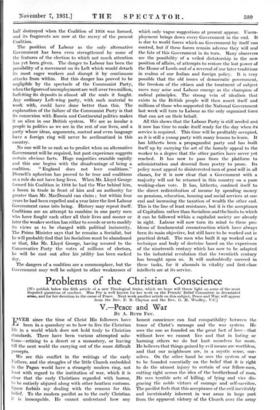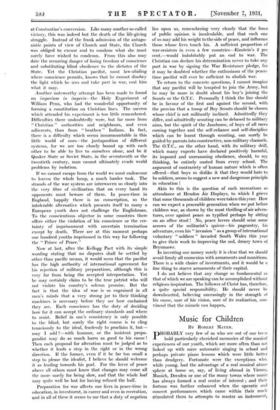Problems of the Christian Conscience
[We publish below the fifth article of a new Theological Series, which we hope will throw light on some of the most disputed questions of conduct. Miss Fry is well known for her work on the Friends' Relief Committee in devastated areas, and for her devotion to the cause of Peace. Next week another article on this subject, Peace and War, will appear from the Rev. P. B. Clayton and the Rev. G. H. Woolley, V.C.]
V.—Peace and War
By A. Rum FRY.
EVER since the time of Christ His followers have been in a quandary as to how to live the Christian life in a world which does not hold truly to Christian standards. There have been various attempted solu- tions—retiring to a desert or a monastery, or leaving 'till the next world the carrying out of the more difficult precepts.
We see this conflict in the writings of the early .Fathers, and the struggles of the little Church embedded in the Pagan world have a strangely modern ring, not least with regard to the institution of war, which it is clear that the early Christians regarded with horror, to be entirely abjured along with other heathen customs. Space forbids my dealing with the reasons for this belief. To the modern pacifist as to the early Christian it is inescapable. He cannot understand how any honest conscience can find compatibility between the tenor of Christ's message and the war system. He sees the one as founded on the great fact of love—that without love we cannot live and that in hating or harming others we do but hurt ourselves far more. He believes that things gained by evil means are worthless, and that our neighbours are, in a mystic sense, our- selves. On the other hand he sees the system of war to be founded essentially on the belief that it is right to do the utmost injury to certain of our fellow-men, cutting right across the idea of the brotherhood of man, He sees terrible acts of killing, of lying and vice dig- gracing the noble virtues of courage and self-sacrifice. The pacifist feels that this acceptance of the evil inevitably and inextricably inherent in war arose in large part from the apparent victory of the Church over the army at Constantine's conversion. Like many another so-called victory, this was indeed, but the death of the life-giving struggle. Instead of the frank admission of the antago- nistic points of view of Church and State; the Church was obliged to excuse and to condone what she must surely have wished to condemn. From this also may date the recurring danger of losing freedom of conscience and substituting blind obedience to the dictates of the State. Yet the Christian pacifist, most law-abiding where conscience pennits, knows that lie cannot disobey the light which he sees and take part in war, cost him what it may.
Another noteworthy attempt has been made to found an imperium in imperio—the Holy Experiment of William Penh, who had the wonderful opportunity of forming a constitution on Christian lines. The success which attended his experiment is too little remembered. Difficulties there undoubtedly were, but far more from " Christian " authorities and neighbours, and even adherents, than from " heathen " Indians. In fact, there is a difficulty which seems insurmountable in this little world of ours—the juxtaposition of different systems, for we are too closely bound up with each other to • be able • to live to ourselves alone, and be it Quaker State or Soviet State, in the seventeenth or the twentieth century, man cannot ultimately evade world problems by isolation.
• If we cannot escape from the world we must endeavour to leaven the whole lump,- a much harder task. The strands of the war system are interwoven so closely into the very fibre of civilization that on every hand its opponents must beware of them. In peace-time in England, happily there is no conscription, so the intolerable alternative which presents itself to many a European youth does not challenge the Englishman. To the conscientious objector in some countries there offers either the violation of his conscience or the cer- tainty of imprisonment with uncertain termination except by death. There are at this moment perhaps one hundred youths imprisoned in this way for following the " Prince of Peace."
Now at last, after the Kellogg Pact with its simple wording stating that no disputes shall be settled by other than pacific means, it would seem that the pacifist has the high authority of international agreement for his rejection of military preparations, although this is very far from being the accepted interpretation. Yet lie may certainly claim to be the true patriot who will not violate his country's solemn promise. But the fact is that the idea of war is so engrained in all men's minds that a very strong jar to their thinking machines is necessary before they see how enchained they are. Each conscience has the duty of deciding how far it can accept the ordinary standards and where to resist. Belief in one's consistency is only possible to the blind, but surely the right course is to cling tenaciously to the ideal, fearlessly to proclaim it, but— may I add ?—with humour, or the insistent propa- gandist may do as much harm as good to his cause ! Then each proposal for alteration must be judged as to whether it leads a step in the right or in the wrong direction. If the former, even if it be far too small a step to please the idealist, I believe he should welcome it as leading towards his goal. For the lover of peace . above all others must know that changes may come all the more surely for being slow, and that the whole loaf may quite well be lost for having refused the half.
Preparation for war affects our lives in peace-time in . education, in investment, in.career and even in recreation, and in all of these it seems' to me that .a duty of negation lies upon us, remembering very clearly that the force of public opinion is incalculable, and that each one of us may add his weight to the side of peace, and influence those whose lives touch his. A sufficient proportion of war-resisters in even a few countries—Einstein's 2 per cent.—would indubitably put an end to war. The Christian can declare his determination never to take any part in war by signing the War Resistance pledge, for it may be doubted whether the enthusiasm of the peace- time pacifist will ever be sufficient to abolish war.
To return to the concrete questions, I cannot imagine that any pacifist will be tempted to join the Army, but lie may be more in doubt about his boy's joining the Scouts or the O.T.C. Personally I think the line should be in favour of the first and against the second, with the proviso that a troop of Boy Scouts should be chosen whose chief is not militantly inclined. Admittedly they differ, and admittedly scouting can be debased to militr;ry aims, but the spirit of the Jamboree, of boys of all races coming together and the self-reliance and self-discipline which can be learnt through scouting, can surely be guided by parents into constructive, non-military channels. The 0.T.C., on the other hand, with its military drill, which many experts have declared positively harmful, its imposed and unreasoning obedience, should, to my thinking, be entirely ousted from every school. The argument of contrariety of human nature which is often offered—that boys so dislike it that they would hate to be soldiers, seems to suggest a new and dangerous principle in education !
Akin to this is the question of such recreations as attendance at Hendon Air Displays, to which I grieve that some thousands of children were taken this year. How can we expect a peaceable generation when we put before children war, as shown by the most thrilling of air adven- tures, over against peace as typified perhaps by sitting on an office stool ! No, peace lovers should seize some arrows of the militarist's quiver—his pageantry, his adventure, even his " invasion " as a group of international voluntary " soldiers " invaded South Wales this year to give their work to improving the sad, dreary town of Brynmawr.
In investing our money surely it is clear that we should avoid firmly all connexion with armaments and munitions. There is a wide choice of investments, and it would be a fine thing to starve armaments of their capital.
I do not believe that any change so fundamental as that of which we are speaking can be accomplished without religious inspiration. The follower of Christ has, therefore, a quite special responsibility. He should never be downhearted, believing unceasingly in the strength of his cause, sure of his vision, sure of its realization, con- vinced that the miracle can happen.















































 Previous page
Previous page